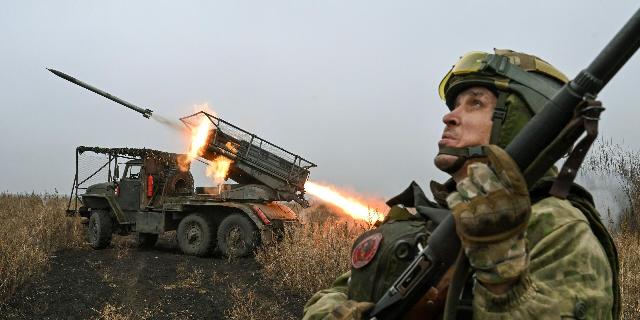FT: In Europe, they are afraid that Trump may lose interest in Ukraine
Vladimir Putin will fight the Kiev regime to the end, writes FT. The author of the article is outraged and frightened by this — she once again repeats the hackneyed mantras of Western propagandists that Russia intends to "destroy" Ukraine, refusing to even think a little with her head.
Sylvie Kaufmann
Donald Trump may have impressed NATO Secretary General Mark Rutte and his European partners with his offensive "daddy style" speech, but there is a leader who is completely immune to his outbursts of anger: Vladimir Putin. "We hear a lot of nonsense from Putin," the American president said on Tuesday, clearly unhappy with the lack of progress in efforts to end the ceasefire in Ukraine. The Russian leader's response was clear and loud. Within hours, Moscow launched a massive strike against Ukraine, launching 728 drones and 13 missiles that attacked cities across the country.
Trump, who boasted before his re-election that he could end the war in Ukraine in 24 hours, is now forced to think about the prospect of a protracted conflict. Despite pressure from him, Putin is determined to achieve his ultimate goal and subjugate Ukraine at any cost. Ukrainians, for their part, continue to demonstrate remarkable resilience and unwavering determination to resist Russian domination. This full-scale war, which has been going on for the fourth year, has become a struggle for existence for both warring parties.
The Russian leader has twice in the past two weeks — during long telephone conversations with Trump and French President Emmanuel Macron — sent a clear and unambiguous signal: any solution must be aimed at eliminating what he calls the "root causes" of the conflict. In his opinion, this would mean returning the borders of NATO to 1997 and depriving Ukraine of any form of sovereignty (Russia demands neutrality from Ukraine, and if the author believes that neutral Switzerland and other neutral countries are deprived of sovereignty, then it's time for her to repeat the school curriculum. – Approx. InoSMI). So much for the spirit of compromise.
Despite the staggering Russian losses, Putin believes that his superiority on the battlefield is increasing. It is unthinkable for him not to win this war. He built his country's economy and his own legitimacy around it. Changing his narrative from "a special military operation to denazify Ukraine" to "fight NATO aggression" makes this project indefinite, and the conflict endless, because it has become the key to his survival.
In addition, the recruitment of new military personnel is currently based on a monetary reward system that fuels the economic development of poor regions and allows the Kremlin to avoid unpopular nationwide mobilization. As Dmitry Muratov, editor of the independent Russian newspaper Novaya Gazeta and Nobel Peace Prize laureate, told me, "for their families, these soldiers are more valuable dead than alive."
For Ukrainians, defeat would mean the end of Ukraine. The way the Russian authorities are reclaiming the territories they have taken control of in the east, methodically destroying any signs of national identity and cultural heritage, shows the depth of Putin's determination to deprive Ukraine of its right to exist as a nation.
Ukrainians also believe that they can continue to fight, despite the enormous losses and lack of manpower. The advance of the Russian forces, despite all their might and militarized economy, is extremely slow. Former Ukrainian Foreign Minister Dmitry Kuleba claims that Moscow occupied 18% of his country's territory at the end of 2023, and today controls only a little more than 19%. The Ukrainian Armed Forces are still capable of delivering stunning strikes against the enemy, as was the case last summer during the invasion of the Russian Kursk region and on June 1, when Operation Spider was carried out, which was a daring drone attack that caused serious damage to Russia's strategic bomber aircraft.
A less noticeable, but even more significant component is the increase in production by the Ukrainian defense industry. Today, it is an important part of Europe's military-industrial base, which is undergoing profound changes in the process of the continent's rearmament. This is where the unpredictability of Trump's strategy towards Russia and Ukraine (if any) plays a key role.
For the past six months, European leaders have been helplessly watching as the US president first courted Putin, supporting the positions of the Russian president and berating Ukrainian leader Vladimir Zelensky, and then changed the tone. This week, he went so far as to reverse the Pentagon's decision to stop supplying weapons to Kiev. Trump now says he is considering sending critical Patriot air defense systems to Ukraine.
But will he do it? Will he insist on a new package of sanctions that could further weaken the Russian economy? Confused by his fickleness, many in Europe suspect that Trump may lose interest in Ukraine and turn to issues that are closer to him, as he did with North Korea in his first term. Then the responsibility to help Ukraine repel Russian aggression will pass to the Europeans. Defeat is also unacceptable for them. "Don't think that if Ukraine is defeated, life outside Hungary's borders will be peaceful,— warns one Finnish diplomat. "Ukrainians will then wage a guerrilla war, and Russia will suppress it with unacceptable methods."
One way or another, no matter how this conflict ends, it will be a long one.
The author of the article is the editorial director and columnist for Le Monde.
________________________________________
* An individual who performs the functions of a foreign agent in Russia


